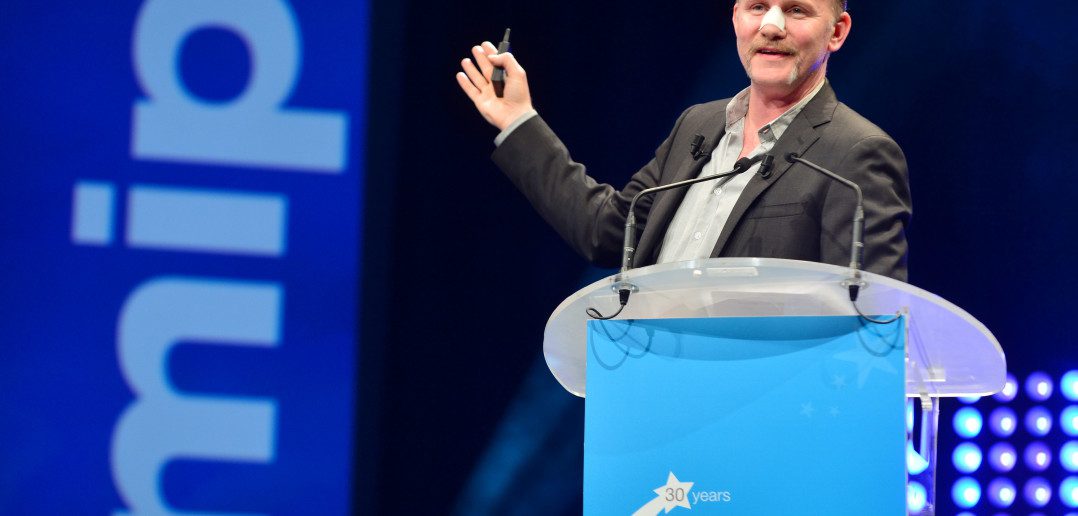Morgan Spurlock, father of such non-fiction projects as Freakonomics, Supersize Me and The Greatest Movie Ever Sold.
When Morgan Spurlock hit the stage this afternoon, there was a huge bandage across the middle of his face. So, as if to clear the air, the first thing he did was explain how he broke his nose.
The story was consumable for a crowd of any age: He was with his seven-year-old son, who, he discovered, can crawl into much smaller things than he can (cue collective « awwwws »). But that wasn’t the reason for the break.
« When you race into monkey bars at full speed… they don’t move, » he finished.
Spurlock knows how to tell stories. But instead of devoting his life to fiction like other great storytellers, he’s decided to tell non-fictional stories better.
« I’ve made a career out of getting people to not only face the harsh realities of this world, but getting them to watch TV shows about those harsh realities, » said Spurlock, ticking off the subjects he’s broached with a fragile public: Fast food, terrorism, education, gay marriage, medical marijuana, and education.
And in the same way his documentaries often unfold, he formatted his talk as a story about his trajectory, benchmarked by valuable lessons for producers of any stripe.
Tip No. 1: Stay ahead of the curve. Hoping to build a content empire, in 1989 Spurlock started a company called The Interactive Consortium, or CON for short. Funny digression: « If you’re trying to raise money, you shouldn’t use a name that lends the impression you’re gonna run off with it! » he said. « Also… you shouldn’t look like a terrorist. Wear a shirt. »
Other companies with similar hopes raised over $100 million. But he started his funding rounds too late—right when the market fell. A chance meeting with Marty Garvey won him a check for $250.000—a fraction of what others had.
Tip No. 2: Narrow your focus.
« There was no reality TV in 2000, » Spurlock recounted. « All non-fiction shows were relegated to public TV. And the show everyone was talking about was Who Wants to be a Millionnaire. »
The show started creeping into broadcast windows more and more often per week, which inspired Spurlock, even though « It was like Regis Philbin all the time. »
« Be inspired by the landscape around you, » he said. « Let the scarcity, or the saturation, become a shining light around you. So I looked at game shows. Four weeks later, we premiered I Bet You Will on the web. »
The premise of this hybrid reality/game show was that there are few things people won’t do for money. « This seems incredibly tame by today’s standards, but in 2000 it was mind-blowing, » said Spurlock. « By the end of the first week, we had 5m viewers; by the second week, CBS called. »
I Bet You Will ran on MTV for 53 episodes, based on the original five-minute web show format. « We did it with a fraction of what giant companies raised. And with that money, we took the first show from the web to TV, » Spurlock said.
When I Bet You will ran its course, the team had $50.000 and its own computers and cameras. The next obvious step? A movie—a chance to take advantage of this brave new world of « massive democratisation of production, » where anyone who owned their own cameras and computers could make a film.
« We’d already planned what the next project was going to be, how we were going to make it, » Spurlock said. The result was Supersize Me, which debuted with what Spurlock calls « The upchuck that launched a thousand ships. »
After the cultural success of Supersize Me, « I didn’t sue anyone who ripped me off, » Spurlock underlined. « Some things are worth more than a lawsuit: it was infinitely more valuable to let others help establish your creative position in the industry. » (Tip No. 3, in case you missed it.)
You also need persistence of vision (tip No. 4!). Reed Hastings of Netflix spent 15 years saying the new normal would be people watching movies on the web. It’s only now that we fully understand the truth of that statement.
Tip No. 5: Know your brand identity. « Filmmakers aren’t crazy hippies and communists anymore. We’re actually ready for primetime, » said Spurlock. But the key is to understand who you are.
During the filming of The Greatest Movie Ever Sold, a psychological branding company broke down Spurlock’s own brand identity, concluding his core values were mindful and playful.
« Your core programming lives and breathes within your identity, » Spurlock said. « Viewers, fans and consumers have the ability to not only give instant feedback on everything you make, but to pass it to others. And they smell bullshit faster than anyone. If it’s not authentic, if it’s not real, you’ve lost them. »
Which guides us to Tip No. 6: Be true to you. Never stray too far from your core brand principles.
Tip No. 7: Take risks within the parameters of your identity. When Spurlock made Seven Deadly Sins, he wanted to « pay homage to shows I loved as a kid, like Alfred Hitchcock, and The Twilight Zone, » he said. « Those programmes are inherent to its DNA but we made sure it didn’t look or feel like any nonfiction show on TV. We made it look like a movie. We created a truly unique and impactful viewing experience. »
This is because they were given free reign in how the content should look and feel. « Let creative people be creative, » he said. « The more you try to force them into a box, » the less original they will be. « I’ve never been let down when I let brilliant people be brilliant. »
Tip No. 8: Be platform-agnostic. It’s the best way to build value, Spurlock emphasised.
« There are great stories that are perfect for a 90-minute film. Others that should be serialised, and others that are great for digital short-form content »—this last, he added, are « more lucrative and exciting than ever before. »
Which brings him to his latest project, Smartish, a channel created alongside Maker Studios. « It’s for people too smart or too ugly for TV, » he joked, adding that it « bridges the gap between TED Talks and reality TV. »
« If you can make someone laugh, you can make someone listen, » he said.
One last tip for the road: « If you don’t own your voice, someone else will, » said Spurlock. « Don’t let someone else tell you what you should be making. It comes down to you: Your mission, your values, and creating something that will take a risk to be different. Being authentic and original ultimately starts with you. »
One quote he’s fond of is something William H. Macy allegedly said. After Fargo came out, it apparently took him 20 years to become an overnight success. Spurlock feels it’s been the same for him. « But hopefully these things prep you for what’s to come, » he said.




